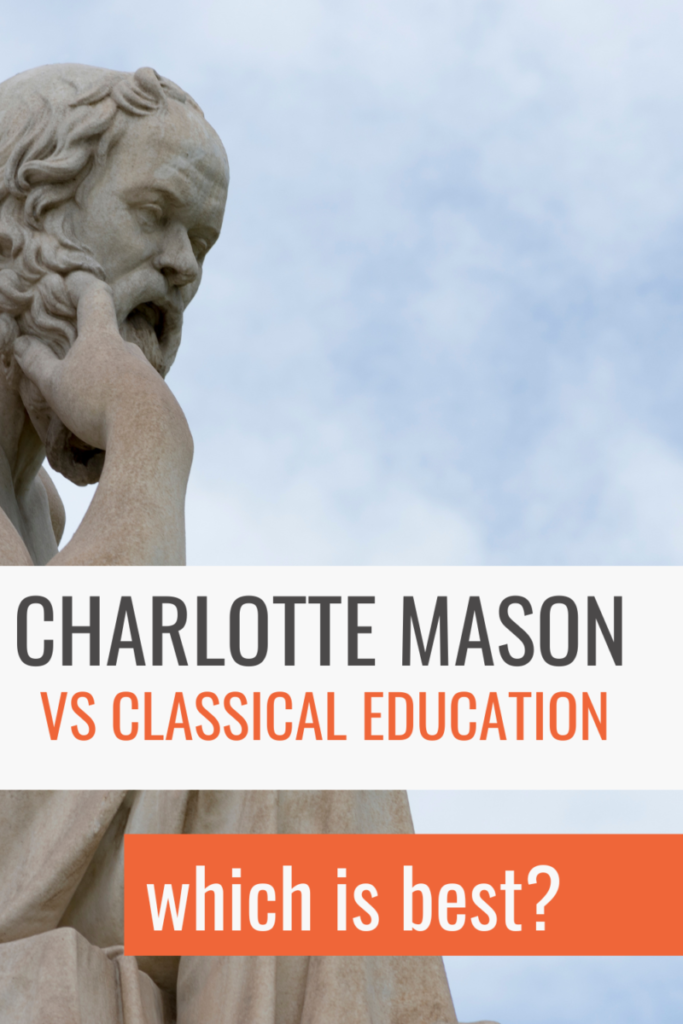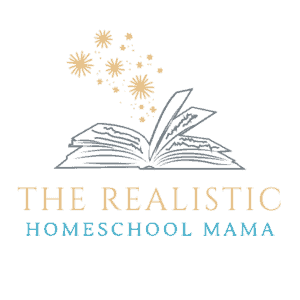The freedom to educate our own children in the whatever method we see best suited to their needs is a freedom I do not take lightly, and am eternally grateful for. SO much is available to us, and there are many options to choose from…literally at our fingertips.
Sorting through so many choices and options can sometimes get a bit overwhelming and so I thought it might be helpful to do a series of posts comparing and contrasting the differences between some of the varieties and philosophies of homeschooling.
So for this post, we will examine Classical Education vs the Charlotte Mason method. Are they the same, or different?
Classical Education focuses on exercising a child’s mind using the principles of the Trivium as opposed to the Charlotte Mason method focuses on feeding a child’s mind through high quality literature. Learning is segmented in the classical education model, whereas the primary goal of a Charlotte Mason education is that the child grows as a whole person.
In this post, I will try to define for you two methods or philosophies available to you.
What is Classical Education?
A Classical education is built on the three ways the mind learns, according to what is know as the Trivium. Trivium means “three roads” in Latin. The three roads are Grammar, Dialectic, and Rhetoric.
Each “road” is a stage of development, and builds upon the next.
- The Grammer stage is typically through about 4th grade and focuses on rote memory to create the building blocks of the mind.
- The Dialectic stage is 5th-8th grade, and focuses on using the building blocks developed in the Grammer stage to build ideas and form opinions.
- The Rhetoric stage, from 9th-12th grades, is where the student then begins to share and present his ideas and opinion to others through debates, speeches, etc.
In my understanding, a classical education’s emphasis seems to lie in that a child will learn to reason.
In classical education learning is very segmented, focusing first on presenting facts to a child, and then later ideas.
Of course, this is just a very brief overview of Classical Education…if you would like to dig a big deeper you might find the essay “The Lost Tools of Learning” by Mrs. Dorothy Sayers interesting.
What is a Charlotte Mason Education?
A Charlotte Mason takes a more holistic approach to learning, and emphasizes that the child grows as a person. Self education is considered the primary means of learning, and education is approached as a whole instead of segmented. Charlotte Mason believed in focusing on the whole child, and not to get in the child’s way through lectures.
Early education in a Charlotte Mason homeschool focuses on giving a child as much free time as possible to explore, and instilling good habits through daily routines.
“…my object is to show that the chief function of the child–his business in the world during the first six or seven years of his life–is to find out all he can, about whatever comes under his notice, by means of his five senses…”
Charlotte Mason
Offering children a feast of ideas at a very early age is a core philosophy of a Charlotte Mason education.
If you are just learning about the Charlotte Mason approach to homeschooling, you may find this post helpful, where I give an overview of what the Charlotte Mason method is, and why it may be a good fit for your family.
Summary of Classical Education vs Charlotte Mason Education
| Charlotte Mason Education Curriculum | Classical Education Curriculum |
| Living Books | Latin |
| Habit Training (read more about this here) | Public Speaking |
| Short Lessons | Critical Thinking |
| Character Training | Virtue Training |
| Outdoor Time | Wisdom Inoculation |
| Art Study | Memorization |
| Christian Study | Christian Study |
| Nature Exploration | Contemplation Time |
| Music Study | Debating Lessons |
| Living Books | Logic Training |
Similarities: Classical vs Charlotte Mason Education
It’s interesting to think about how Charlotte Mason’s educational approach may have been influenced by her Classical training. Perhaps the similarities between the two approaches are due in part to Mason’s own background.
Classical education can be quite demanding, and Mason may have felt that students needed a more gentle approach. That’s why she discarded some elements of the Classical system and kept others. In doing so, she created her own unique style of education.
So let’s discuss of few of these similarities…
Value of Memorization
Charlotte Mason and classical educators both value memorization. However, they realize that it is only effective if students are memorizing facts at the correct age.
For elementary students, memorization can be exciting. However, if middle or high school students are asked to memorize too much, they will likely hate the task.
Charlotte Mason believed that memorization was an essential tool for learning, and that it helped to develop a student’s mind and understanding. Classical educators also believe in the importance of memorization, as it helps students to learn and remember information more effectively.
Emphasise on Great Literature
Charlotte Mason and classical education both emphasize the importance of reading widely, especially from the Classics. By reading the best books, we can learn valuable lessons about life.
Mason took this a step further by suggesting that parents find ‘living books.’ These are books that not only teach important lessons, but also hold the reader’s attention. Aesop’s Fables is a perfect example of a living book.
Both Mason and classical educators believe that reading is essential for a well-rounded education. By reading widely, we can gain knowledge and wisdom that will stay with us for a lifetime.
“Thought breeds thought; children familiar with great thoughts take as naturally to thinking for themselves as the well-nourished body takes to growing; and we must bear in mind that growth, physical, intellectual, moral, spiritual, is the sole end of education.”
Charlotte Mason
Teacher Led Learning
Both methods encourage the use of a curriculum containing basic subjects such as grammar, history, and mathematics.
This is markedly different from unschooling, where studies are entirely child-led. (If you want to know more about the details of the Unschooling philosophy, be sure to check out my post on the subject here).
In both Charlotte Mason and Classical educations, students learn challenging texts they might not choose if learning were solely child-led. This can be beneficial, as it ensures that students are exposed to a variety of material. However, it may also be frustrating for some students who would prefer to learn at their own pace.
Perfection Encouraged
Classical and Charlotte Mason education both focus on quality work and encourage students to produce work of the highest standard.
Writing is practiced until it is beautiful and elegant.
Spelling is memorized until students are star spellers.
Proper pronunciation and diction is empasized.

Differences: Classical vs Charlotte Mason Education
While there are a lot of similarities between a Classical Education vs Charlotte Mason homeschooling, there are also some dramatic differences, as we touched on above.
Let’s discuss some of these differences more in depth…
Gentleness and Personalization
Giving students a curriculum to learn without much deviation can be a great way to ensure that they learn the material. However, it is important to remember that each child is unique and may learn best in a different way.
Mason’s approach to education was different from the Classical approach in that she focused on shorter lessons and encouraged parents to teach with their specific child in mind. This allowed for a more personalized learning experience that didn’t rely on dry textbooks.
She also felt that students should not have to struggle through dry textbooks to learn a lesson. Instead, she encouraged a love of living books, which are more fun and engaging than traditional textbooks.
Mason’s approach to education is based on the idea that all children are unique and should be taught in a way that suits their individual needs. This approach is more effective than the one-size-fits-all approach of classical education.
Mason’s approach seems to be more in line with how children actually learn. By making the learning process more fun and engaging, students are more likely to retain the information.
Learning Latin
It may seem strange to teach children Latin (after all, it’s supposed to be a dead language!), but there is a good reason every child learned it back in Charles Dickens’s time.
Teaching children Latin is a bit of an outdated concept, but one that is still emphasized within the Classical Education model.
Latin is not dead, but lives on in all the “romantic languages”. Learning Latin gives students a strong grasp on the English language, as they are able to grasp the Latin root within the language.
Classical education realize this and focus on giving children a good foundation in Latin in elementary and middle school years.
Classroom Setting
Classical education is designed for a classroom situation, with a teacher leading a group of students through a set curriculum.
Charlotte Mason’s approach is more personal, with the teacher working one-on-one with students or in very small groups.
This would be almost impossible to do effectively in a large classroom setting. Mason’s approach would be far better suited to a smaller class size, or even one-on-one instruction.
Valuing Art and Music
Although both methods value art and music, Mason seems to promote these elements slightly more than classical educators. This is likely because Mason places a higher value on the imagination and creativity. Classical educators, on the other hand, may view art and music as more of a tool to be used for learning other subjects.
Different Ages for Beginning Education
A classical education typically starts around age five. The thinking is that parents shouldn’t waste the earliest and most formative years of a child’s development.
Charlotte Mason, on the other hand, was fearful that if parents started their children too early, the children might get burned out and become resistant to education instead of developing a life long love of learning.
Debate and Argumentation
Another significant difference between classical vs. Charlotte Mason education is the development of the art of debate.
In the second stage of a classical education, great emphasis is placed on learning the art of logic and argumentation, and then in the third stage, children learn to debate with a gracious and respectful attitude.
Debate and logic are not disciplines that are highly practiced in a Charlotte Mason education.
Verbal Narration
Verbal narration is greatly emphasized for students of Charlotte Mason Homeschooling. Having a child retell and summarize a story after hearing it helps them to learn. Classical Education involves parents or teacher in explaining subjects more.
Learning from Nature
Charlotte Mason education is well known for it’s focus on engaging in nature.
Classically educated people do not necessarily encourage engagement with nature, whereas Mason believed nature is a wonderful teacher. She thought children should spend plenty time in the yard, field trips, or on picnics. These opportunities allow students learn the names of trees and plants, insects, bushes, animals, and the seasons. They can sketch these things and learn about the seasons. Mason also believed that getting children outdoors was good for their physical and mental health. A day out in the countryside could be a lovely, educative, stress-free day, for the whole family.
In conclusion, there are pros and cons to both Classical Education and a Charlotte Mason approach. Personally, I lean hard towards Charlotte Mason, but am able to see the value in the Classical approach as well.
Recent Posts
There are a LOT of things about the Charlotte Mason method of homeschooling that appeal to me. However, the theory of intentionally developing good habits in your children is one that I admittedly...
Over the years, I've explored many different homeschool methods and philosophies. While there are definitely benefits to many, I have especially fallen in love with the Charlotte Mason method of...



